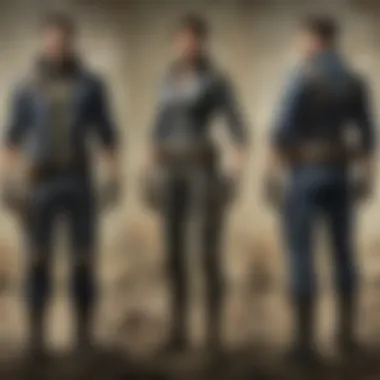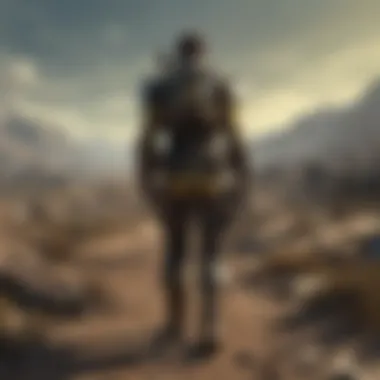Understanding Waywardness in the Fallout Universe


Intro
In the realm of the Fallout game series, the term 'wayward' evokes various interpretations. As players traverse this engaging yet starkly divided wasteland, they encounter characters and narratives marked by unpredictability. This exploration concentrates on the ways in which waywardness influences character arcs, enriches storylines, and shapes player interactions. Through a methodical examination, we aim to unravel the layers of complexity present in both character evolution and decision-making.
Lore Insights
Overview of the Fallout Universe
The Fallout universe presents a post-apocalyptic landscape shaped by nuclear war and societal collapse. The remnants of humanity fight for survival amid the ruins of past civilizations. This scenario provides fertile ground for discussions of waywardness, as it frames characters and factions that often operate outside traditional moral bounds. As post-apocalyptic themes entwine with personal quests, a diverse cast of characters reveal their distinct survival instincts and motivations.
Key Historical Events in the Fallout Timeline
Understanding the Fallout's history is paramount in comprehending the 'wayward' themes. A few notable events include:
- The Great War in 2077, which instigated global turmoil
- The establishment and rise of the different factions such as the Brotherhood of Steel and the Institute
- Major upheavals in cities like New Vegas and The Capital Wasteland, leading to shifts in power dynamics
These events underpin much of the narratives, influencing characters' decisions and relationships, often compelling them to venture down surprising paths.
Deep Dive into the Backstory of Major Factions and Characters
Delving deeper, each faction embodies motivations that often reflect conflicting ideals. For instance, the Brotherhood of Steel aims to reclaim and preserve technology, though their methodology can reconcile neither sympati nor revisionism. Conversely, the Institute promotes scientific advancement at moral costs, prioritizing fate over ideology. Understanding these narratives is crucial to comprehending how waywardness plays a central role, leading inhabitants of this world to question their destinies and commitments.
The exploration of the wayward concepts invites players to deduce wisdom from unexpected choices, encouraging reflections on integrity and survival.
Gameplay Tips and Strategies
Embracing waywardness translates seamlessly into the gameplay experience. As one navigates challenges, effective strategies can mean survival in the Fallout universe. Some helpful tips include:
- Beginner's Guide to Playing Fallout Games: Start by familiarizing yourself with the core mechanics, understanding SPECIAL attributes, and getting adapted to the environment.
- Weapon and Armor Recommendations: Choose equipment tailored to your playstyle, focusing either on melee or ranged combat. For novice players, overwhelming options can deter progress; hence selecting simpler gear initially is often wise.
- Tips for Efficient Resource Management: Regularly search for resources while limiting wastage. Crafting and repairing gear when possible is invaluable during advancing levels.
Character Analysis
A comprehensive appraoch here underscores the relevance of character depth in the Fallout series. Key areas include:
Detailed Profiles of Iconic Characters
Characters such as Piper Wright from Fallout 4 and The Courier from New Vegas offer unique perspectives on waywardness. Character motives often celebrate personal narratives intertwined with broader story arcs.
Relationships Between Characters in the Fallout Series
Tracking relationships between ideas can uncover hidden complexities in moral choices. Characters often experience betrayals and alliances, illustrating how gambled choices create wayward pathways in the narrative.
Character Development and Evolution Across Games
Significant character transformations can embody the theme of waywardness. Characters grow in unexpected ways, influenced by players’ decisions leading to comprehensive arcs and unexpected outcomes.
News and Updates


Staying informed is essential for fans. Recent data shows:
- Announcements from publishers regularly enrich the gaming experience, paving the way for communication with the developer community.
- Patch notes frequently address gameplay issues, privileging player espera
- Community tournaments allow players to affect their journeys in unique ways that reflect their interests, strengthening ties within fandom.
Fan Theories and Speculations
Engaging with popular fan theories can unravel startling dimensions of the Fallout universe. Participants speculate on unresolved plot points—oftentimes, these theories challenge assumptions and foster captivating discussions regarding character motivations and potential future events.
Relevant resources abound where players convene. Exploring platforms like reddit.com can aid in discovering personalized narratives.
In summary, with themes of waywardness so deeply ingrained in character analysis and narrative frameworks, we illuminate a path that invites both seasoned fans and newcomers into an informed discourse surrounding Fallout. The shared experiences rife with dilemmas and unpredictable encounters provide fertile opportunities for engagement.
Defining the Wayward
Importance of Defining the Wayward
In this article, defining the wayward serves as foundational framework to understand the nuances of this ancient and complex concept. It lays ground for subsequent discussions regarding character development, gameplay mechanics, and narrative structures in the Fallout universe. Waywardness encapsulates a rebellious spirit, a divergence from social or moral standards, and a struggle for self-identity in challenging environments.
By appreciating what it means to be wayward, players can better analyze their in-game choices and experiences. The interplay between a player's moral compass, the storyline, and its setting enriches engagement. This topic also assists in cultivating a deeper comprehension of the role wayward characters play in shaping emotional and psychological landscapes in video games.
Etymology and Meaning
The term
The Wayward in Fallout Narratives
The exploration of waywardness serves as a central pillar in the narratives presented in the Fallout series. This concept brings to light themes of defiance, individuality, and the complex relationships these characters build with the world around them. In post-apocalyptic storytelling, waywardness is not merely an attribute, it is a construct that challenges both player perspectives and game mechanics. It drives narrative arcs and informs character choices, leading to an immersive player experience.
Understanding the ways in which the
Waywardness and Player Choices
The concept of waywardness deeply influences player choices in the Fallout series. It underscores every decision made by players. Each choice carries weight, compelling players to explore not just the consequences of their actions but the moral grounds on which those actions are taken. Different paths arise from this system of choices, affecting the game's narrative arc, character relationships, and even the Earth's fate. Within this context, understanding waywardness becomes intrinsic to exploring the player's clout in steering their destiny.
Moral Dilemmas
Moral dilemmas abound in Fallout, creating a framework that assesses the nature of choice. Players routinely encounter situations where the right action is not clearly defined. Perhaps they face an NPC in distress, requiring support but representing a faction they oppose. The question then becomes: should they assist this individual or remain steadfast to their principles?
These choices often lead players to grapple with broader themes of right and wrong. Fallout utilizes this approach effectively. Players may not even realize the weight of their decisions until after the repercussions manifest. These dilemmas elevate the gameplay experience, prompting reflection from players on their own ethics and intent. As they navigate different conflicts, wayward choices push each player down a unique path, offering a sense of ownership and individuality in how they unfold their stories.
Consequences of Wayward Choices
The result of decisions made in Fallout may resonate through its intricate narrative framework. Actions reflect a player's association between personal objectives and those within the game world. Players frequently see how their wayward choices yield both immediate and long-lasting outcomes.
- Relationships Shift: With each decision, relationships with allies and enemies morph. Players might alienate allies by pursuing selfish goals, setting the stage for potential conflict or loss.
- Lasting Impact: Events unfold based on previously made decisions, resulting in permanent shifts to the world. One song or quest choices influence entire outcomes, such as the fate of entire settlements.
- Personal Reflection: Players are left pondering their choices post-game, creating a lingering effect long after they have set down the controller.
In sum, moral dilemmas paired with the resultant outcomes create compelling gameplay that resonates both personally and narratively within the Fallout universe. This unfolding dynamic not only defines the game experience but enhances the wayward theme that shades every chapter of player engagement.
Gameplay Mechanic Implications


Understanding how the mechanics of gameplay influence player experiences is crucial. In a game like Fallout, the emphasis on player agency and decision-making is salient. Each mechanic not only structures the narrative but shapes player actions and reactions in the game world.
Moreover, gameplay mechanics serve as a mirror reflecting the themes of waywardness prevalent in the Fallout series. Of particular importance are the following two elements:
Exploration of the World
Navigating Uncertainty
In Fallout, navigating uncertainty is fundamental. The game's design allows players to roam vast, open landscapes filled with unpredictable encounters. This wandering is emblematic of waywardness. Uncertainty shapes player philosophy, encouraging them to weigh their options gravely before engaging with the challenges they face.
The key characteristic of this mechanic is the unpredictable environment. Every corner turned may reveal a hidden threat or an unexpected ally. This is seen as beneficial; it keeps gameplay dynamic and player decisions relevant. Navigating through ambiguity enhances suspense and intrigue, which makes players feel more immersed.
A unique feature here is the potential for exploration leading to different outcomes. Navigating uncertainty invites players to take risks,66107562223 explore new territories, and confront hostile NPCs, making every journey thrilling. However, this can also induce frustration if players feel ill-equipped to handle unexpected events or if the loss feels unduly punitive.
Discovering Hidden Lore
Lore discovery is another compelling aspect of exploration, past layers that players peel back to learn about the game’s rich narrative tapestry. Hidden lore serves as both a reward and an enlightening agent that connects players to the world of Fallout. What may initially seem daunting becomes an a pathway to immersive storytelling.
The most significant trait of discovering hidden lore is the balance it strikes between effort and reward. Players delve into the past to unveil stories rich with history and consequence. This strategy not only satisfies the curiosity of seasoned players but also offers newcomers an incentive to engage fully with the Fallout universe. Lore elements often give hints on character motivations, core themes, and even ramifications of the player’s choices.
One of the advantages of revealing hidden lore is its ability to augment character development and elevate the stakes of decision-making. However, too much hidden content may leave players feeling lost or overwhelmed if they cannot piece together the information. Gaining insights into the past fosters a sense of continutity, but it can also create additional challenges in navigation and pick decisions that hold personal stakes.
Combat and Survival Strategies
The manner in which combat is designed in Fallout ties similarly to waywardness. Combat strategies do not merely focus on defeating opponents but also surviving in an unforgiving world. Players must adapt to varying conditions. Using stealth, direct confrontation, or even technological advantage fosters diverse individual playstyles.
This flexibility respects player agency and enforces lessons learned about resource scarcity, both in-game and about making wise choices under varying conditions. Each encounter assesses not just skill at arms but tactical environmental navigation as well.
Crafting survival strategies thus links back philosophically to the wayward theme. Every decision symbolizes a broader narrative about straying, intent, and adapting to post-apocalyptic melodies woven through both narrative content and player agency. Ultimately, the interplay of gameplay mechanics in Fallout illuminates core tenets surrounding waywardness and contributes to the story’s core framework and impact.
Thematic Interpretations
The thematic interpretations of waywardness in Fallout are crucial for grasping the complex experiences available to players. These interpretations help to illuminate the gray areas of morality, choices, and human relationships post-catastrophe. Players encounter a world where individual actions resonate through communities, and the past weighs heavy on their decisions. Understanding these themes deepens one's appreciation for the intricate narratives woven throughout the Fallout series.
Isolation versus Community
Isolation and community serve as two opposing forces within the Fallout universe. The often desolate landscapes evoke a natural sense of solitude. Fallout protagonists typically experience a deep sense of estrangement from others. This is visible as they traverse empty landscapes, each settlement a small bastion of society among the ruins of the past. These environments starkly contrast the essential human need for social connectivity. Such isolation can lead to dire consequences. It challenges players to make significant choices:
- Trusting others or going solo
- Banding together for survival or sliding into selfishness
In narratives like that of Fallout 3, the protagonist's journey often reflects a longing for belonging, shared kinship, and solidarity. Conversely, the game's decision-making hinges on player actions. By choosing how to interact with non-player characters, players either reinforce isolation or forge connections through camaraderie, quests, or combat. Each choice underlines how one relates to others, shaping the overall experience.
In contrast, communities have clearly depicted strengths, yet they come with unique problems. Players can see communities recuperate or decay based on the actions taken. Communities reflect the ebb and flow of hardship and recovery, providing brief respites against the gritty environments surrounding them.
Legacy of the Past
The legacy of the past looms large in Fallout. History influences deeply not only character arcs but the broader world-building. As fragmented societies craft new identities, remnants of their previous selves often hold essential clues to understanding their struggles.
Players encounter echoes of pre-war civilization, uncovering technology, cultures, and history hidden away in vaults, terminals, and the sceneries of abandoned places. Learning about previously established communities gives valuable insights into how civilization might reform, or conversely, repeat the mistakes of the past.


Central to this legacy is the way waywardness distills lessons from previous atrocities. Survivors frequently grapple with ghosts of the past. They seek redemption or pay for sins committed in the name of survival. Characters in games often reflect this internal battle. They navigate their existence while piecing together a coherent sense of who they are against the ruins of once-great institutions.
As such, players often hold a profound impact on how legacies manifest within scenes of vibrant and shadowy communities. The ramifications of personal choices reverberate through historical trails shaping two critical questions:
- How does history guide the present?
- What role do individuals play in history?
In summary, the theme of legacy in Fallout extends a hollistic look into past civilizations while engaging players in a multilayered experience. By navigating complex storylines surrounding wayward characters, each choice reverberates beyond the immediate impacts, reinforcing the interconnected nature between the historical and the contemporary.
Waywardness, through the lens of isolation and community, influences how players interpret not just their personal narratives but hang their understanding of a society on human resilience and the weight of legacy.
Comparative Analysis
Comparative analysis is key in understanding the concept of waywardness in various narratives across numerous mediums. By juxtaposing how this theme is portrayed in Fallout to its representation in literature and film, analysts can gain a richer perspective. This approach not only illuminates commonalities and differences but also furthings our grasp of cultural narratives associated with wayward individuals.
The examination necessitates careful thought of several vital elements. First, it enhances appreciation of storytelling technique. Second, it uncovers potential influences that literature and film may have on games. Lastly, it showcases the development of character and theme over time.
Waywardness in Other Media
Literature
Literature provides profound insights into the thoughtful nature of waywardness. Such stories often offer deep character introspection. Th central property is, of course, narrative. Through exploring the psyche of wayward characters, authors can paint specific social critiques. The uniqueness of prose allows for a nuanced exploration of inner conflict, enabling audiences to connect personally with domain of characters.
Readers benefit from the analytical depth literature can provide, creating spaces for reflection not present in more visual forms of storytelling. However, a drawback may be that it requires significant time investment and introspective reflection.
Film
Film as a medium reacts to sound and visual cues to explore designed worlds. Its dynamic properties allow the representation of waywardness visually, thus conveying feelings and themes instantly. Films engage viewers with powerful emotional performances placed within graphic depictions of conflict and resolution. This action-oriented aspect frequently attracts large audiences, making film an accessible option for rapid digestion of themes.
However, the drawback lies in its limited depth as compared to literature. Complex character development must often be condensed due to time constraints, potentially diluting the intricacies of wayward character arcs.
Lessons for Game Design
In studying the waywardness across media, game design can absorb these observations, particularly in character development and mechanics. Notably, more dynamic interactive experiences at the player’s base journey can create a unique waylesson for understanding choice and consequence in facitated gameplay, which is paramount for achieving manual objectives within game ergonomics. Consequently, blending cinematic narratives allows game designers to form expansive worlds that engage and provoke thoughtful player reaction.
Finale
The examination of waywardness in the context of the Fallout series reveals a multi-layered and intricate relationship between characters, narratives, and player choices. Understanding this theme is essential for appreciating the depth found within the game, as it captures the struggle of individuals seeking a place in a chaotic world. This exploration reinforces the emotional resonance that many players feel, making each journey personal as they navigate their paths.
Summary of Insights
Throughout the article, it has become clear that waywardness serves as more than just a character trait; it embodies the tensions of survival in a post-apocalyptic realm. Key insights include:
- Character Development: Wayward characters often face complex moral dilemmas, influencing their evolution.
- Narrative Nuance: Story arcs highlight the wayward's journey, often marked by conflict and resolution.
- Player Impact: Choices made by players reflect their own values, further enriching the gameplay experience.
The interactions between the game elements highlight the extraordinary potential of wayward characters to engage players, enriching their experience.
“Every choice has its consequences, creating a ripple effect that reshapes future gameplay.”
Future Directions for Research
Looking ahead, there is significant potential for further exploration in this area. Future research might consider:
- Deepening Character Analysis: More detailed studies on how specific characters exemplify or subvert the wayward archetype within each game.
- Expanding Gameplay Mechanics: Investigating the broader implications of player choices on the environment and narrative structure across different games.
- Cross-Comparative Studies: Analyzing waywardness in other games outside the Fallout series, illuminating similar themes in various narratives.
- Cultural Influence: Examining how global cultural perceptions of waywardness inform the portrayal of such characters in video games.
This framework fosters a critical understanding of simple to complex storytelling, providing room for new insights and varied discussions in the realm of game design and narrative construction.







